In 2017 a mass grave was discovered at a former Roman Catholic care home in Tuam, County Galway. Excavations uncovered a subterranean structure containing the remains of innumerable babies and children, most aged between 35 weeks and three years old.
The site of the excavation was un-consecrated ground at the former Bon Secours Mother and Baby Home. Local historian, Catherine Corless, discovered the death certificates of almost 800 infants who died at the home. She found burial details for only two. This prompted an investigation into the site.
Operating between 1926 and 1961, the Bon Secours Mother and Baby Home was run by a Catholic order of nuns and housed unmarried pregnant women. Babies were forcibly taken from their mothers soon after they were born and kept by the sisters until they could be adopted. Or until they died of neglect and starvation.
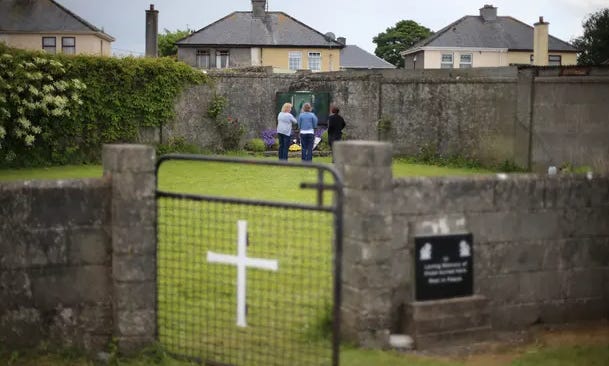
The notorious Magdalene Laundries in Ireland enslaved and exploited so-called ‘fallen women’. The women and girls incarcerated and forced to work in these institutions were those who’d had to find a living in prostitution, those who’d suffered sexual abuse, unmarried pregnant women, girls thought promiscuous… indeed, any girl deemed “undesirable” could find herself imprisoned in one of these asylums.
The girls sent to these institutions were frequently robbed of their names and were kept imprisoned for years, often even for life. Survivors of the laundries have described the horrendous conditions and treatment, isolation from the outside world and sexual, psychological and physical abuse.
The Magdalene Laundries were in operation for over two centuries and run by orders of Roman Catholic nuns.
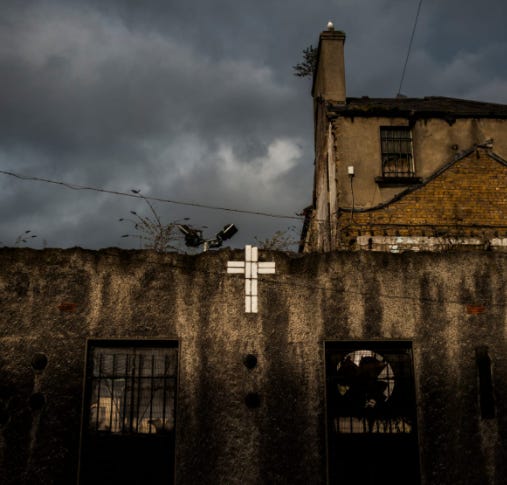
The Catholic church’s influence adversely affected the maternity care of women in Ireland as late as the 1980s, dictating the use of unnecessary and outdated surgery.
Symphysiotomy is a surgical procedure once used to alleviate obstructed labour during childbirth. It involves slicing through the cartilage and ligaments of the pelvic joint and, in extreme cases, cutting through the bone of the pelvis itself. It is a traumatic procedure and can leave patients with long-term health implications including severe pain, incontinence, gynaecological problems and walking difficulties.
This surgery was used during the 19th Century but, as clinical practices improved and developed, the caesarean section superseded it as a far safer procedure. Consequently, symphysiotomy hasn’t been practised in Europe for around 70 years.
However, thanks to the Roman Catholic Church’s objection to the caesarean section and its disregard of female autonomy, symphysiotomy remained prevalent in Ireland until the late 20th Century.
An estimated 1,500 women in Ireland suffered this procedure, usually without their knowledge or consent, between the 1940s and 1980s. Many were left with serious and lifelong health issues.
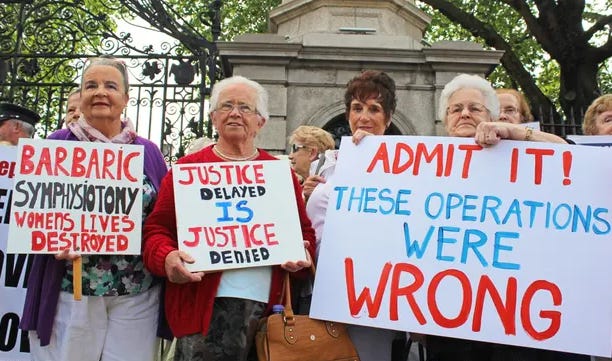
In Ireland women’s lives continue to be blighted by the unquestioning adherence to a religious belief.


Last week a violent and dangerous teenager, a trans-identified male who calls himself “Barbie Kardashian”, was placed on remand in the women’s wing of Limerick Prison. (Not the first time a sexually violent male has been housed in a women’s prison in Ireland.)
He’s already sexually assaulted two women, viscously attacked another and talks openly about raping and murdering countless more.
On Wednesday the Limerick Leader reported on Irish feminist group, Radicailín, protesting against this violent male offender being housed in the female estate.
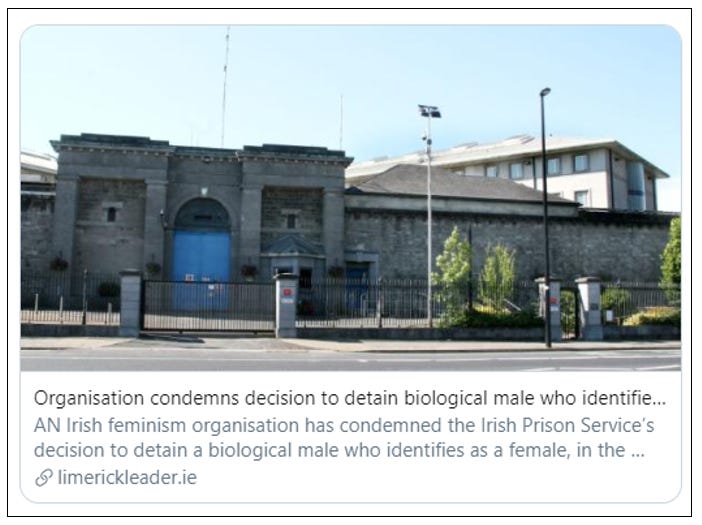
In response to its entirely accurate reporting of the story, an independent councillor for Limerick City West, Elisa O’Donovan, accused the paper of '“making stuff up”. She called it “Gutter journalism” and tweeted a laughter emoji. Does she think it’s funny or unimportant that vulnerable female prisoners are being accommodated with a dangerous male?

The Limerick “Feminist” Network responded to the article by declaring that “Trans women are not a threat to cis women” and claimed that a male offender would never consider identifying as a woman in order to gain access to the female estate.
(Is that right, Limerick ‘Feminist’ Network? Never heard of Karen White or Katie Dolatowski or Jessica Winfield or Tara Desousa or Janiah Monroe or Kristen Lukess or Lisa Huaxwell or Laken McKay or Aliea Rose Brown or Paula Witherspoon or Davina Ayrton or Johanna Wolf or Marie Dean…?)
These privileged faux-feminists are more concerned about ‘dead-naming’ a trans-identified male than they are about defenceless women, many already traumatized by male violence, being forced to share accommodation with a man described as ‘homicidal’.
Elected public representative, Cllr Elisa O’Donovan, dove on another opportunity to prioritise a violent male over the female prisoners in need of her protection.


Would Cllr O’Donovan and the women of the Limerick “Feminist” Network be prepared to spend a night in the cells with a dangerous youth who has sexually assaulted two women and violently attacked another with such ferocity that he tore off her eyelids and ripped out clumps of her scalp?
No, of course, they wouldn’t. But they’re never likely to be in that position, are they? Hence they feel able to throw their sisters to the wolves with such impunity.
And now it seems that Barbie Kardashian has been released on bail, a group of excited young women supporters waiting to meet him as he left detention.
For centuries Irish nuns visited unimaginable cruelty upon women less fortunate than themselves. They did it to appease the male overlords of their religion and to protect their own position of privilege.
When Ireland repealed the eighth amendment, it seemed as if Irish women had finally escaped from under the thumb of religious oppression. The story of “Barbie Kardashian” shows that Irish women are still oppressed by an ideology that largely benefits men, and some women are only too happy to collaborate with them.





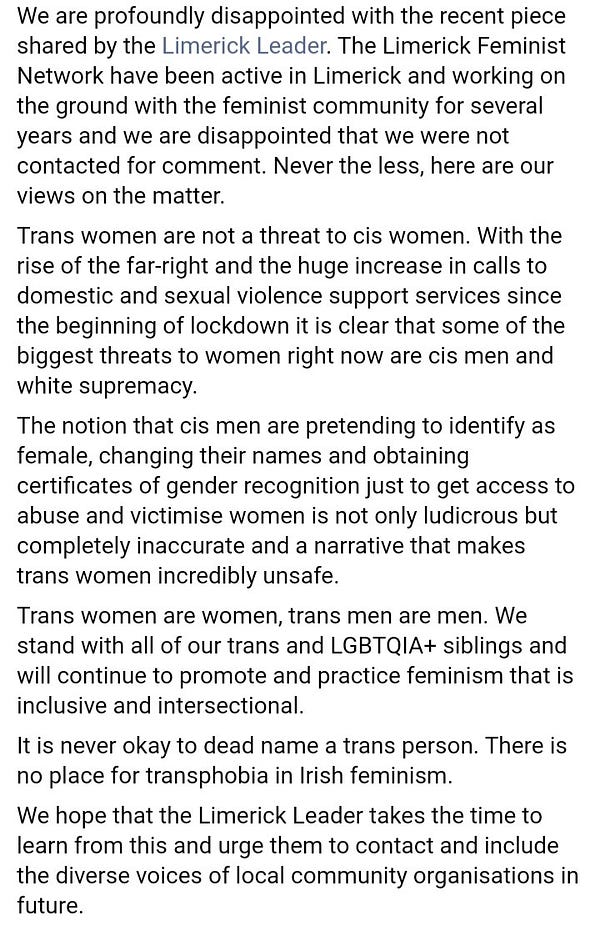


I was the an art director on the film 'The Magdalene Sisters'. The research I did opened up a world that shocked me to the core. I am from Belfast and I had no idea. There is a chilling documentary out there somewhere (which the film took a lot from. Real women telling their stories. Ninety year old women still grieving for their taken children. Raped by uncles and then hidden away forever. An absolute disgrace that these women were treated in such an an appalling way, and that it was denied for decades. I think many people in Ireland (of a certain age), have a story connected to this subject. I remember my mother saying that when she was a girl, one day her best friend just wasn't there. She was told she had gone to live 'away'. She never saw her again and no one would answer questions. My family is from Bushmills on the North Antrim Coast. I was working with a guy a few years back who was from around there too. He made a joke - 'What's the most confusing day in Bushmills?' Father's Day.
I am glad as hell I am not in Ireland, and really horrified at the fate of our Sisters there.
Back in India, in some of the village areas, the Women are still supposed to give a normal birth at home with no proper medical facilities, their families have some weird prejudices regarding cesarian. So many Women die in the process.
Also most of people are aware of Burkha and head and face covering systems back here - for Women only ofcourse, Some of the backward cities here have Females appropriated to Home maker role.
Makes You realize how many Women across world are being oppressed and suffering since centuries and it continues endlessly.
Thank You JL for it, I had missed 2 tweets in twitter clutter.👍